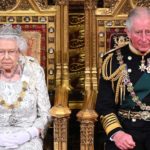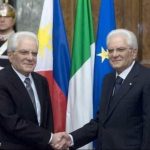EMANUELE LOMBARDINI
Unite Europe after II World War, but also entertainment. When EBU (European Broadcasting Union) was founded in 1954, at Montreux Palace Hotel, the scenario that presented itself was that of a devastated continent, which needed to find itself and restart, not only from the economic point of view. There was a need to bring people and nations together and the newborn television was perfect for the purpose.
The experimentation of a simultaneous live broadcast between several countries was the other big reason that led to the birth of paneuropean entertainment programs into the Consortium.
Eurovision Song Contest was the first one: the idea was launched in 1955 at Palazzo Corsini in Rome, when the then RAI general manager Sergio Pugliese and EBU general manager Marcel Bezencon laid the foundations for what will become the first major pan-European entertainment program and which today is the the most viewed non-sports television program in the world, with its 210 million viewers at the same time.
Eurovision: a music contest but also a cultural arena
But almost 70 years after its first edition (the one of the Kursaal Theater in Lugano in 1956), today Eurovision is no longer just a music competition or an entertainment program: for over 30 years – but in particular since 1993, when a lot of Eastern Europe countries entered competition – the contest has become a real diplomatic passage, a catwalk in which to show their respective national identities, meerged with the European one, based on the values of an inclusive society without its own barriers of the Western world and which are also a founding part of the Ventotene Manifesto and the subsequent EU.
The way of self-representation, often through stereotypes and the choices that are proposed, represent the postcard of themselves that each national TV (and therefore each country) wants to promote to the rest of the Continent (and not only, given that the geographical boundary of the EBU also includes the Mediterranean Basin).
Beyond the musical and television aspect, Eurovision is today one the biggest and most important european cultural arena, where zeitgeist in on stage: Eurovision is at the same time the least and the most political competition that exists: it is in fact forbidden to refer to specific parties or ideas, but its anchoring to current events makes it absolutely vulnerable to the geopolitical situations of the Continent and this inevitably ends up reflecting itself on the entries, on the votes and also on the attitude of fans towards some nations.
Countries like Estonia or Latvia have launched their own campaign for EU membership precisely starting from hosting Eurovision, others like Serbia or Turkey are squeezed between the will to enter the EU and the will to bring within it one’s own vision, which is often in conflict with the values that inspire it. Still others like Israel or Ireland have had to deal with particularly difficult internal situations over the years.
For everyone, however, participating in Eurovision and winning it, and then organizing in its home soil, has almost become a primary requirement for entering ‘Europe’. Deepening about Nation Branding geopolitical implications on Eurovision can be found on this italian book.

EBU Eurovision Song Contest spin-off: not only pop music
Several spin-offs were born from that event, each with different characteristics.
Above all, the “Junior” version of Eurovision (for children aged 9 to 14), created in 2003 and which will be staged in Paris the next 19 December. But under the umbrella of the EBU, parallel competitions were also born such as the Eurovision Young Dancers, the festival for young professional dancers (closed in 2017), the Eurovision Young Musicians, a biennial event dedicated to the talents of classical music, up to the very recent Choir of the Year, the biennial contest dedicated to professional choirs organized together with Interkultur association.
In all these events, countries have also had the opportunity to present themselves in their linguistic and ethnic entirety but especially in recent times, it is in the minor competitions that these specificities find space. At the Junior Eurovision for example, Ireland performs exclusively in Irish Gaelic, and from some years ago, the United Kingdom has been ‘unpacking’ into its home nations, as is in sport: Wales and the Welsh language made their debut at both the Junior Eurovision and the Choir of the Year and, again in this latter contest, debuted BBC Alba, the Scottish language branch of British national television.
Switzerland, which has already proposed all four national languages in competition at Eurovision at least once, at the Choir of the Year has also extended the field to two other linguistic entities, “Swiss German” and Patois, the Alpine dialect Franco-Provençal also spoken in Italy and France.
It’s a knockout: playing with nations
We should also not forget “It’s a knockout”, the popular EBU game program aired throughout Europe from 1966 to 1999: in this case, the successful attempt was to unite Europe (also here wer national TVs that competed, represented by cities and towns) through a friendly competition of an athletic and playful type. Long itinerant, with singles countries called to host a couple of episodes every year, in the last four editions the show was based in Italy, before closing due to tripled organizational costs.
Outside Eurovision: a showcase festival and a prize to unite Europe
Outside the EBU, two others paneuropean entertainment events deserve mention. The first is Europe Music Moves Europe Talent Awards, the prize created under the aegis of Creative Europe and European Commission to reward the best talents of the European music scene. From 2018 this award replaces the one that was reserved for the “Breakthrough Newcomers”, the EBBA Awards.
Prize is assigned by a group of musicians, radio speakers, journalists, events managers starting from the reports sent by EBU radio members.The awarding takes place every year in January as part of the Eurosonic Noorderslag, the largest music showcase festival in Europe, hosted each year in January in several locations around Groningen, the Netherlands, organized by the homonymous non-profit in collaboration with the Reperbahn Festival and all the major European independent music festivals. There are over 200 artists from all over Europe who take turns on stages around the city in just three days.
Author Profile
- Emanuele Lombardini is our blog editor-in-chief. He is an experienced journalist, a Libdem, Italian and passionate European.
Latest entries
Post Disclaimer
The opinions expressed by the author of this post do not necessarily represent the opinions and policies of ELfR.





